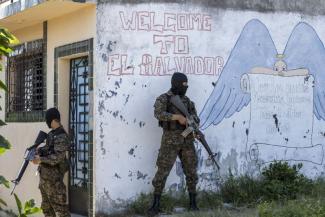Civil war
Fleeing the peace

A declared goal of development policy is to prevent people from fleeing. Experience shows that it takes more than the formal end to a conflict to achieve this goal. Afghanistan, Nepal and El Salvador are examples of emigration continuing long after peace has supposedly set in.
Making matters more complex, it is often hard to tell whether people are forced to leave their home or go voluntarily. The distinction is actually not clear cut. Fear of violence may compel people to leave even if no one points a gun at them. The mere knowledge that perpetrators of human-rights violations are still at large can drive people from their homes. If people cannot find livelihoods, moreover, they have incentives to leave. Several motives thus have an impact on the ultimate decision.
Felix Haaß, Sabine Kurtenbach and Julia Strasheim of the Hamburg-based German Institute of Global and Area Studies (GIGA) assess matters in a recent paper. They point out that real peace is more than the absence of war. Social divides must be bridged after a civil war. All too often, the authors warn, the political system remains controlled by well-established elites and former combatants as well as young people struggle to find decent jobs. Accordingly, migration from the countries concerned is not only likely to continue, but may actually be useful in the sense of reducing the likelihood of fresh violence. This setting is common even among post-crisis countries that get substantial official development assistance.
The authors argue that organised military violence is not the only kind of violence that marks civil wars. After an armistice or even a formal peace agreement, other forms of violence often continue almost unabated, including murder, torture, rape and robbery. Former militias, informal gangs or feuding clans may be involved. The desire to take revenge plays a role too. According to the research paper, many countries are really neither at war nor at peace.
It is generally assumed that institution building serves to involve all parties in the politics of a post-conflict country. In practice, however, that cannot be taken for granted, the GIGA team warns, and the lack of inclusiveness means that many people will be tempted to leave. Even when a country does not slide back into all-out war, the scholars write, old institutions often persist and mark the post-conflict era. On the other hand, they note that fewer people migrate from a country when they see real opportunities to get involved in politics in a meaningful way.
Judicial institutions matter too, according to the scholars, because human-rights abusers will keep wielding considerable influence unless they are tried and punished. For those they made suffer during the war, moreover, it may be intolerable to live in the same neighbourhood even if the criminals are no longer influential. Putting perpetrators on trial always takes time, the GIGA paper states, and the transition to peace will stay incomplete until that happens.
The authors’ message to international policymakers is that donors should focus on peace dividends benefiting the broader population rather than merely aiming to mitigate the direct impacts of crisis and pacify elite groups. Otherwise the formal termination of war will fail to address the root causes of flight and migration, even though donor agencies may make considerable investments in the peace process.
Hans Dembowski
Link
GIGA: A study: Fleeing the peace, emigration after civil war.
https://www.giga-hamburg.de/en/publication/fleeing-the-peace-emigration-after-civil-war













